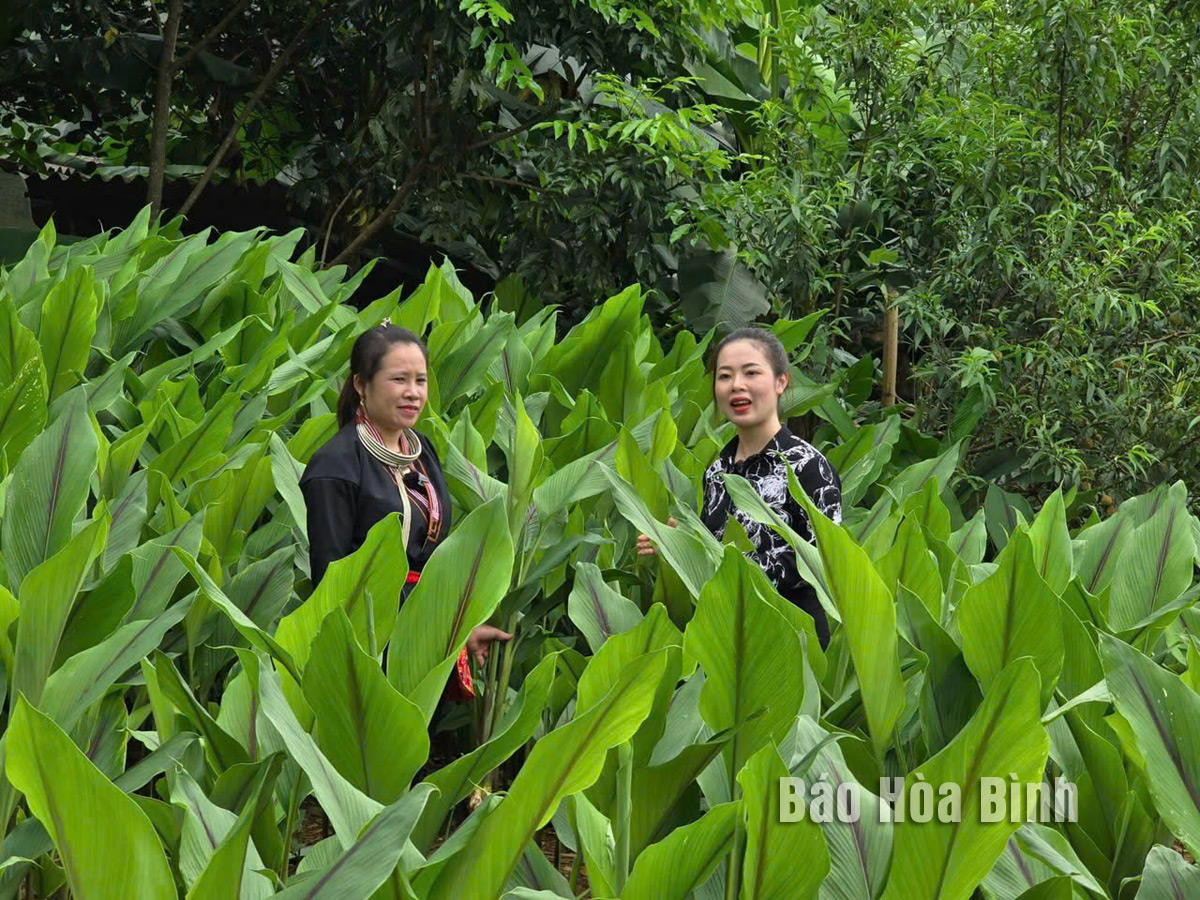
The Dao ethnic community in Tien Lam hamlet, Bac Phong commune, Cao Phong district is not only preserving their generations-old herbal remedies but also giving them a touch of professionalism. The Nam Ngoc Sang traditional medicine cooperative stands as a testament to this harmonious blend of ancestral knowledge and contemporary production techniques, creating quality herbal products that safeguard cultural heritage while generating tangible economic value.
Nam Ngoc Sang cooperative builds local herb-growing areas to support its
production.
Director of the cooperative Bui Thi Ngoc discovered her passion for herbal
medicine in 2018 when she began crafting remedies herself. Driven by a desire
to preserve and elevate this traditional craft, Ngoc rallied fellow villagers
to form the cooperative. Today, seven dedicated members are committed to
sustaining and expanding the rich legacy of Dao herbal medicine.
Since
its establishment, the cooperative has forged partnerships with local farmers
to source medicinal herbs and expanded its own plantation to over one ha. This
lush landscape nurtures valuable plants such as xa den (Celastrus hindsii),
khoi nhung (Ardisia silvestris), black turmeric, and thien nien kien (Homalomena
occulta).
With a steady inflow of resources, the cooperative has invested in machinery
and equipment to produce professional-grade herbal products. Their offerings
include topical balms and oral remedies designed to alleviate joint pain and
stomach ailments. Currently, the cooperative boasts eight products, with
standout items like stomach relief extracts and traditional Dao herbal bath
remedies.
To broaden its market reach, the cooperative has received invaluable support
from the Women’s Unions at various levels. Through networking and assistance
events, members attended training workshops, secured free product traceability
stamps, and joined trade fairs across the northern region. These helped
increase brand recognition and market outreach. Annually, the cooperative
produces around 300kg of herbal extracts and two tonnes of raw medicinal herbs,
primarily sold through trade fairs, at its workshop, and online.
Chairwoman
of the communal Women’s Union Bui Thi Dung underscored the cooperative’s role
in generating economic value and providing stable employment. Members earn an
average monthly income of 8-9 million VND, while an additional 20 local women
benefit from seasonal work, earning 5-6 million VND per month.
Beyond preserving Dao traditional medicine, the cooperative has contributed to
local employment and development. In recognition of its outstanding efforts,
the cooperative was honored by the provincial Women’s Union in 2023 as part of
the "Outstanding Grassroots Leaders and Community Role Models"
program.
More than just an information technology teacher, Bui Van Nien is an inspiring figure who has nurtured the scientific curiosity and creative spirit of students in Vietnam’s ethnic minority communities.
Da Bac is the most disadvantaged mountainous district in Hoa Binh province, with ethnic minorities accounting for about 90% of its population. Over the past years, the district has mobilised resources to implement ethnic policies to improve the quality of life of local people.
In recent years, Hoa Binh province has consistently prioritised the protection, care, and education of children, particularly those from ethnic minorities and disadvantaged backgrounds, by creating a safe, healthy, and nurturing environment for their all-round development.
The Steering Committee for Tobacco Harm Prevention and Control of Hoa Binh province, in coordination with the Tobacco Harm Prevention and Control Fund, held a ceremony on May 28 in response to the World No Tobacco Day (May 31) and the National No Tobacco Week (from May 25 to 31). The event was chaired by Nguyen Van Toan, Standing Vice Chairman of the provincial People’s Committee and head of the Steering Committee.
Since 2021, the Center for Industrial Promotion and Industrial Development Consulting (CIIDC) under the Department of Industry and Trade has been implementing a school lighting model as part of the plan for using energy efficiently and economically in Hoa Binh Province in the pẻiod of 2021 - 2025. This model not only aims to improve the learning conditions and enhance the education quality, but it also promotes the message of energy saving, energy security, environmental protection and contributes to the goals of socio-economic development.
In the 2024 - 2025 school year, the entire Hoa Binh provincial education sector includes 520 educational institutions and schools. Among them are 13 ethnic boarding schools with 153 classes and 4,487 students. Four of these schools have met national standards, reaching 30.7 percent.



